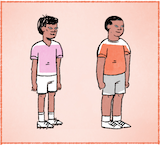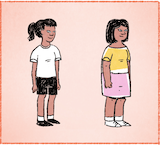

เขากำลังเฮ็ดหญัง เขากำลังยืนอยู่
มีเด็กน้อยพุซายสองคน เขากำลังยืนอยู่ เขายืนเฮียงกันอยู่สองคน เขาใส่กางเกงขาสั้นเทิงสองคน ใส่เสี้ยแขนสั้นเทิงสองคน
คนยืนฝั่งซ้ายโตจ่อยๆ คนยืนฝั่งขวา อ้วนบักคักหนึ่ง
คนอ้วนๆ เขาใส่เสี้ยสีแดง คนจ่อยๆ เขาใส่เสี้ยสีซมพู
15
เขากำลังเฮ็ดหญังอยู่ มีเด็กน้อยพุหญิงสองคน เขากำลังยืนอยู่ เขากะยืนเฮียงกัน เขายืนเฮียงกันอยู่สองคน
พุหนึ่งโตจ่อยๆ พุหนึ่งโตบักอ้วนหนึ่ง
คนใส่เสี้ยสีขาว เขาสิจ่อย จ่อยบักคักหนึ่ง คนใส่เสี้ยสีเหลียง เขาสิอ้วน อ้วนบักคักหนึ่ง
คนอ้วนเขาน้ำหนักหลายบ่ กะหลายอยู่ คนอ้วนสิน้ำหนักหลาย หลายบักคักหนึ่ง
Link to overview page
Link to dictionary
| Isaan | Pronunciation | Tones | Thai | English/Notes |
|---|---|---|---|---|
| เขา | khao | M | เขา | personal pronoun: he, she |
| กำลัง | gam-laŋ | M-HR | กำลัง | auxiliary indicating continuous or progressive action |
| เฮ็ด | het | H | ทำ | to do, to make |
| หญัง | ɲaŋ | M | อะไร, เป็นหญัง = ทำไม | 1. what {เขากำลังเฮ็ดหญัง = What is he doing?} {ธูปเอาไว้เฮ็ดหญัง = What are incense sticks for?} 2. something, anything, (nothing) 3. เป็นหญัง[...]คือ in initial position: why {เป็นหญังเขาคือใส่บักพิกลงไปในกวยเตียว = Why is he putting chili in [his] noodle soup?} {เป็นหญังหน้าต่างมันคือเปิด = Why is the window open?} {เป็นหญังมันคือมีควนไฟ = Why is there smoke?} |
| ยืน | yʉ:n | M | ยืน | to stand |
| อยู่ | yu: | H | อยู่ | 1. to be (located) at 2. yet, still 3. auxiliary indicating continuous or progressive action {ทอดปาอยู่ในกะทะ = (in the process of) frying a fish in the pan} {แม่กำลังเมี้ยนเฮียนอยู่ = mother is cleaning/tidying up the house} |
| มี | mi: | HR | มี | 1. to have 2. there is |
| เด็กน้อย | dek-nɔ:i | M-HF | เด็ก, เด็กน้อย | child |
| พุซาย | phu-sa:i | H-HR | ผู้ชาย | man, male |
| สอง | sɔ:ŋ | M | สอง | two |
| คน | khon | HR | คน | person, people |
| เฮียง | hi:aŋ | HR | เรียง | 1. to line up, to stand in a row {มีพุซายสามคนยืนเฮียงกันอยู่ = three men are standing in a row} 2. to arrange Notes: see also เลียง |
| กัน | gan | M | กัน | mutual, each other, with another, together {เขากำลังนั่งเว้ากัน = they're sitting and talking} {เขาสองคนฮักกัน = they love each other} {ปาสองโตนี้ ใหญ่ห่างกันหลายบ่ = These two fish here, are they very different in size (from each other)?} {ต่างกัน = to be different (from each other)} {ก่องอันไหนหนักกว่ากัน = Which box is heavier (than the other(s))?} |
| ใส่ | sai | H | ใส่ | 1. to put something in/on {เขาใส่บักพิกในกวยเตียวหลาย = he's putting a lot of chili in his noodle soup} {เขาบีบยาสีฟันใส่แปงสีฟัน = he squeezes toothpaste on the toothbrush} {ก่องเอาไว้ใส่ของ = boxes are there to put stuff in} 2. to wear (clothes) {เขาใส่เสี้ยแขนญาว = he's wearing a long-sleeve} 3. directed at {เอิ้นใส่กัน = to call each other/to say to each other} {หมามันเห่าใส่แมว = the dog barks at the cat} {ล้องเพงใส่ไม = to sing into the microphone} {เขากำลังซี้มือไปใส่พุซาย = she's pointing at the man} |
| กางเกง | ga:ŋ-ge:ŋ | M-M | กางเกง | trousers Notes: synonym: ส้ง |
| ขา | kha: | M | ขา | leg {ขาหน้า = front leg} {ขาหลัง = hind leg} {ส้งขาญาว = long trousers} |
| สั้น | san | LF | สั้น | short |
| เทิง | thə:ŋ | HR | ทั้ง | 1. up to, all, all of, the whole of, altogether {เขาใส่กางเกงขาสั้นเทิงสองคน = both are wearing short trousers} {เขาเป็นพ่อของลูกเทิงสามคนนี้ = he's the father of these three [children] here} 2. เทิง ... เทิง ...: both ... and ..., ... as well as ... {เทิงมีใบพ้อม เทิงมีเหลียนพ้อม = there are notes as well as coins} Notes: pronunciation: also realized as ทัง |
| เสี้ย | si:a | LF | เสื้อ | shirt |
| แขน | khɛ:n | M | แขน | arm |
| ฝั่ง | faŋ | H | ฝั่ง | 1. side 2. river/canal bank, shore |
| ซ้าย | sa:i | HF | ซ้าย | left |
| โต | to: | M | ตัว | 1. body, self 2. clf. for animals, characters/letters/consonants, appliances, clothes (e.g., pairs of trousers, shirts) |
| จ่อย | jɔ:i | H | ผอม | thin |
| ขวา | khwa: | M | ขวา | right |
| อ้วน | u:an | HF | อ้วน | fat |
| บักคักหนึ่ง | bak-khak-nʉŋ | M-H-H | intensifier: very, very much (variant of คัก) | |
| สี | si: | M | สี | 1. color 2. colored pencil, crayon |
| แดง | dɛ:ŋ | M | แดง | red |
| ซมพู | som-phu: | HR-HR | ชมพู | pink |
| พุหญิง | phu-ɲiŋ | H-M | ผู้หญิง | woman, female |
| กะ | ga | M | ก็ | 1. then, consequently 2. also |
| พุ | phu | H | ผู้ | 1. person 2. clf. for people {พุหญิงพุหนึ่ง พุซายพุหนึ่ง = a woman, a man} {ซู่พุซู่คน = everybody} {พุหนึ่งโตจ่อยๆ พุหนึ่งโตบักอ้วนหนึ่ง = one person is slim, the other is fat} Notes: pronunciation: also realized as พู่- |
| หนึ่ง | nʉŋ | H | หนึ่ง | 1. one 2. after adjective: intensifier {บักคักหนึ่ง = very much} {อันบักใหญ่หนึ่ง = very large}, or attenuates the meaning {กะดาดมันแผ่นน้อยๆ หนึ่ง = the piece of paper is [relatively] small} |
| บัก | bak | M | 1. intensifier before adjectives {ปาโตบักใหญ่ = a (very) large fish} 2. prefix in front of fruits and vegetables {บักแตงโม = watermelon} 3. can be used as a reference for a male person of the same or younger age {บักอันนี้ = this lad} |
|
| ขาว | kha:o | M | ขาว | white |
| สิ | si | M | จะ | future tense auxiliary {เขากำลังสิตื่น = he's about to wake up} {สิไปตะหลาด = [I'm] going to the market} |
| เหลียง | li:aŋ | M | เหลือง | yellow |
| น้ำหนัก | na:m-nak | HF-M | น้ำหนัก | weight |
| หลาย | la:i | M | เยอะ, มาก | many, much, very |
| บ่ | bɔ: | H | ไม่ | 1. no, not 2. question particle, transforming a statement into a question Notes: spelling exception in line with common usage on social media |